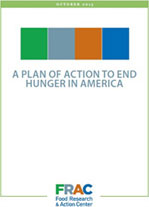Supporting Older Adults in the Nation’s Capital During Older Americans Month
Throughout May, we recognize and support older adults during Older Americans Month. Older adults, defined as someone over 60 years old, make up a large portion of our nation’s capital, as well as a large portion of those experiencing food insecurity and utilizing Supplemental Nutrition Assistance Program (SNAP) benefits. According to the Food Research & Action Center, the District of Columbia has one of the highest rates of older adult food insecurity in the nation, with 12.8 percent of older adults experiencing food insecurity. Almost 22,000 of the District’s older adults participate in SNAP (around 16 percent of all SNAP participants).
The D.C. Council recently passed three bills that would increase local support for older adults — the No Senior Hungry Omnibus Amendment Act, the Senior Nutrition, Health, and Well-Being Equity Amendment Act of 2022, and the Give SNAP a Raise Amendment Act.




